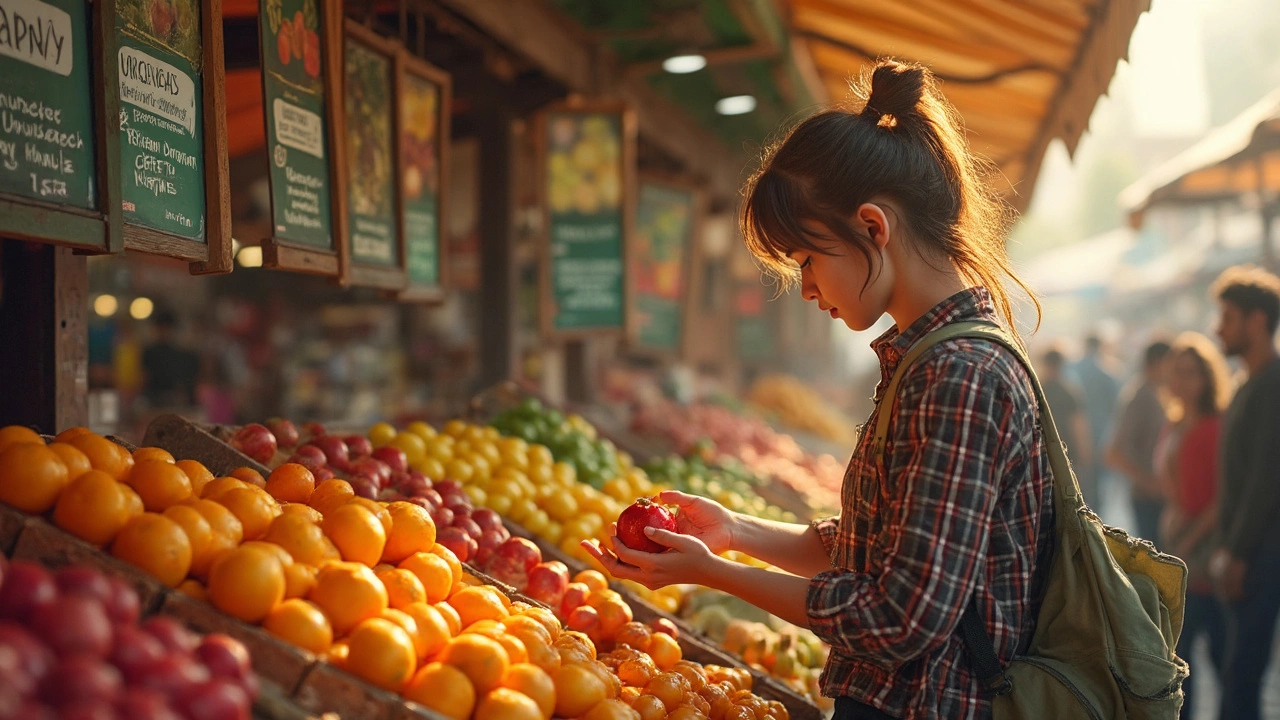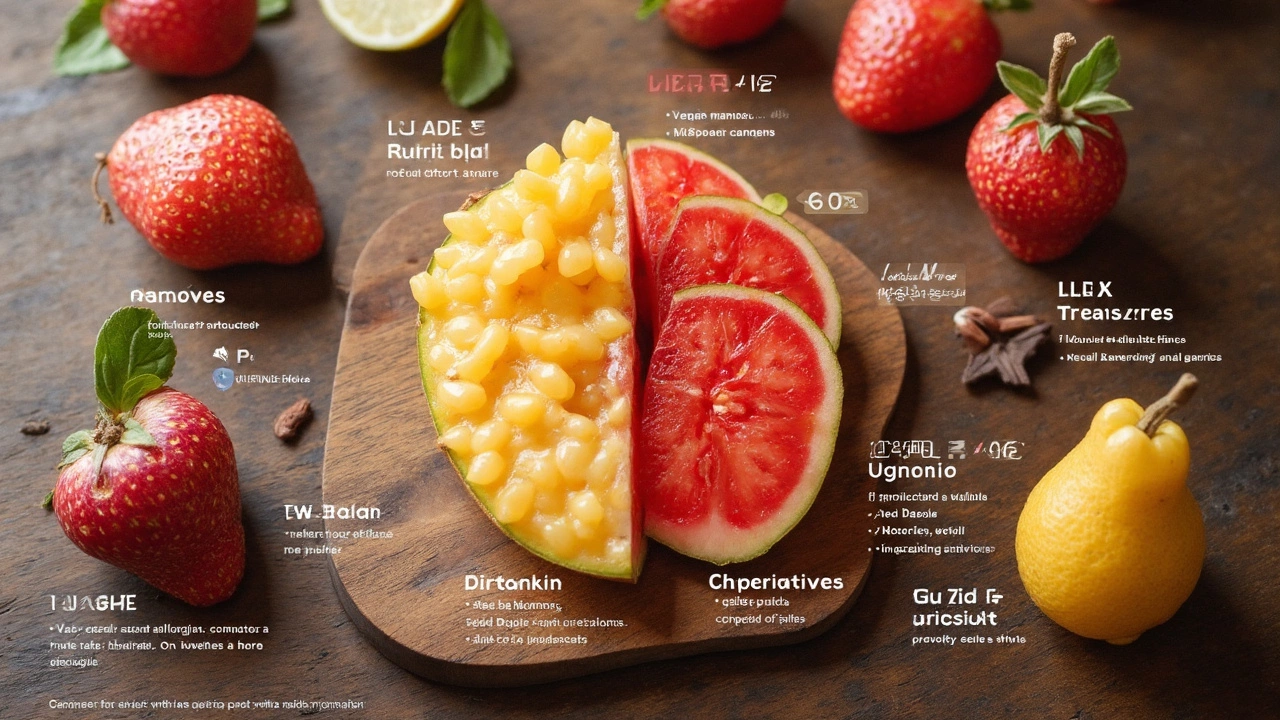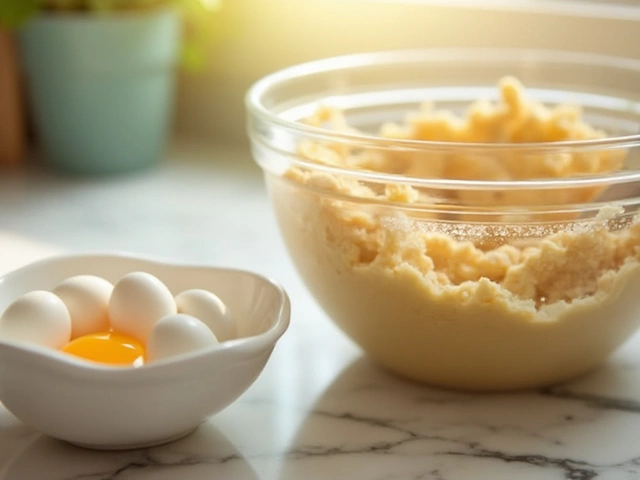
Alright, so you might be thinking, 'How on earth can fruit not be vegan?' It seems ridiculous, but when you dig into it, things get a little more complex than just 'it's a plant, so it must be vegan.' Some fruits are coated with non-vegan waxes, often containing shellac, which comes from an insect. This is done to keep them shiny and to extend their life on the shelves.
But that’s not all. Even before they hit the supermarket, some fruits are grown using fertilizers or pesticides that can be derived from animals. Veganism is all about rejecting animal exploitation, and for some, this includes the impact on bees and other wildlife that might be affected. So, the fruit you grab could have a behind-the-scenes story that’s not quite what you'd expect from a peaceful plant.
If you're all about keeping your fruit bowl free from animal products, knowing what to look out for is key. There are ways to spot vegan-friendly fruits and make sure your vegan desserts stay true to your beliefs. Let’s break down exactly what you should know.
- The Unexpected Fruity Dilemma
- Understanding Fruit Waxes
- Animal-Derived Practices
- Identifying Vegan-Friendly Options
- Tips for Vegan Dessert Lovers
The Unexpected Fruity Dilemma
When we talk about vegan desserts or a plant-based lifestyle, fruit seems like a no-brainer. It's right there in nature, seemingly untouched by animal products. But, hold on a second. Some fruits undergo treatments that aren't exactly vegan-friendly before they land on our plates.
Take for instance the shiny apples, cucumbers, and even some citrus fruits, which are particularly guilty in this unexpected dilemma. They often get their glossy look from a coating of wax. While this might seem like a harmless process to keep fruits fresh and attractive, the kicker is that many of these waxes contain non-vegan ingredients, like shellac derived from the secretions of the lac beetle.
Did You Know?
A lot of people might not realize that even the growing process can involve animal products. Certain non-vegan fruit uses fertilizers derived from animal bones or blood, going against vegan principles.
For those committed to a vegan diet, this creates an annoying dilemma. You want to enjoy the goodness of fruit without compromising your values, right? So, what can you do?
Decoding Fruit Labels
Here's a practical tip: check for labeling or ask your local grocer if the wax is plant-based. Sometimes, fruits marked as organic may use carnauba wax from palm leaves instead of shellac, offering a more vegan-friendly option.
And hey, if you're ever unsure, a quick scrub with warm water can help eliminate most waxes. It's not a perfect solution but it helps, especially when you're in need of an immediate fix.
There's even more to learn, so stick around as we dive deeper into how animals play roles in unexpected places.
Understanding Fruit Waxes
Here's something you might not know about those shiny apples that catch your eye in the grocery store: they're often coated with a layer of wax. But don't let the shine fool you—this wax isn't always as 'natural' as it seems. Fruit waxes can be a hidden snag for those following a vegan lifestyle.
What is Fruit Wax?
Fruit wax is used to replace the natural wax lost when fruits are cleaned before shipping. It’s great for keeping moisture in and preventing mold, which means your fruit lasts longer. Sounds good, right? Well, the catch is that some waxes aren't plant-based.
Types of Wax Used
- Synthetic Waxes: These are usually vegan and are derived from petroleum. While not everyone's favorite since they're not the most eco-friendly, they don't involve animal products.
- Carnauba Wax: This is a plant-based option that comes from the leaves of a Brazilian palm. This one's a safe bet for most vegans.
- Beeswax: Used less often, beeswax is a red flag for vegans since it's an animal product.
- Shellac: Here’s a kicker—derived from the secretions of the lac bug, shellac is definitely not vegan.
With different waxes out there, it can be tricky to know what's on your fruit. And, fun fact, labels aren’t always required to specify. So, here's the deal: when it comes to keeping your fruit truly vegan, it pays to understand these coatings.
How to Spot Vegan Waxes
If you're getting serious about making sure your fruits are vegan, you might want to consider:
- Organic Fruits: Often, organic fruits are a safer option as they may not use synthetic waxes.
- Farmers Markets: Talking directly to the seller means you can ask about their waxing practices.
- Washing Thoroughly: A little elbow grease can remove some wax coatings, but not all. Using veggie washes and peeling can help too.
Wax on fruit might seem like a small detail, but it makes a big difference for anyone trying to adhere strictly to a vegan lifestyle. Knowing the ins and outs of fruit wax can keep your diet as clean as your conscience.

Animal-Derived Practices
Most of us don't give much thought to what's involved in getting an apple from the tree to the store. However, non-vegan fruit practices can sneak in at different points, shattering the illusion of a cruelty-free snack.
First up, there are fertilizers. Some fruit farms use animal-based fertilizers, which are derived from bone meal, blood meal, or fish emulsion. This isn't universal, but it's something to be aware of if you're strictly against using anything animal-related.
Then there’s the issue of pest control. Many fruit growers use pest control substances that are animal-derived or impact animal populations. For instance, bees can be affected, which can be a dealbreaker if you're also considering the environment and bee populations.
Shellac and Beeswax: Not Just for Candles
Did you know that some fruit is polished with shellac? Shellac comes from lac bugs and is used on fruits like apples to make them shiny. Similarly, fruits like oranges might be coated with beeswax. While these coatings are harmless to eat, they don’t fit the vegan label.
These coatings are primarily used to prevent moisture loss and protect against spoilage. It's practical, but not exactly vegan-friendly. Look for fruits labeled as 'organic' or unwaxed if you want to avoid these coatings.
How Can You Avoid Animal-Derived Products?
- Opt for organic produce since organic standards often limit animal-sourced inputs.
- Buy from local farmers' markets where you can ask about farming practices directly.
- Wash your fruits thoroughly if you can't avoid waxy coatings.
Remember, being aware and asking questions goes a long way in staying true to a vegan lifestyle.
Identifying Vegan-Friendly Options
Diving into the world of fruits as a vegan can be tricky, but there are ways to make sure you're picking the right ones. Whether you're a fan of vegan desserts or just want to keep your diet as plant-friendly as possible, here's how you can be sure that your choices align with your values.
Check the Wax
The fruit wax is the main culprit when thinking about non-vegan fruit. Wax can be made from animal-based ingredients, and that's a no-go for vegan diets. Next time you're at the store, look out for fruits with labels that say "no wax" or "vegan wax." This simple step keeps your snack time guilt-free!
Know the Growers
If you're serious about maintaining a vegan commitment, getting to know the growers behind your produce can make all the difference. Many organic farmers avoid using animal-based products and focus on cruelty-free methods. Check marketplaces that highlight organic and plant-based farming. A quick chat with the vendor can also reveal a lot.
Local and In-Season
Buying local and in-season fruit can steer you towards more naturally grown produce that usually doesn't need wax or treatment for long shipment miles. Local markets often feature growers who are more transparent about their methods.
Break Down the Labels
Not all labels will shout 'vegan,' but some might include phrases like "plant-based," "animal-free," or have a vegan logo. Here’s a little table of commonly seen labels and their meanings:
| Label | Meaning |
|---|---|
| No Wax | No artificial wax applies |
| Certified Organic | No synthetic chemicals used |
| Plant-Based | No animal ingredients included |
With these tips, you can confidently fill your fruit bowl, ensuring everything inside fits your vegan lifestyle. A little bit of investigation can go a long way in maintaining conscious choices that align with your ethical eating habits.

Tips for Vegan Dessert Lovers
If you're diving into the world of vegan desserts, you're probably wondering how to ensure all your ingredients—fruits included—are genuinely vegan. Here’s what to keep in mind to keep your sweet treats animal-free.
1. Choose Unwaxed or Organic Fruits
Many fruits at the grocery store are coated with wax, some of which aren’t vegan. Look for unwaxed options, especially for apples, oranges, and lemons. Another option is going organic. Organic certifications often mean fewer or no wax coatings, so they can be a safer bet for vegan tips seekers.
2. Become Friendly with Labels
Check packaging labels not just for wax coating info, but also for any hidden animal-derived ingredients. Understanding terms like 'shellac' or 'carmine' can help you dodge non-vegan products. It’s not just about fruits; even gels or other additives could have traces of animal products.
3. Make the Most of Farmers' Markets
Shopping locally is a win for any vegan dessert creator. Chat with sellers at farmers' markets about which fruits are free of non-vegan treatments. Plus, you're supporting local farmers, which feels great!
4. Consider Frozen Fruits
Frozen fruits are often picked at peak ripeness and usually don’t undergo the same waxy processes. They can be perfect for off-season fruit cravings in your desserts!
5. Easy At-Home Alternatives
Make your own fruit purees or peels at home. It's way easier than you think and keeps you in control of what ends up in your desserts.
Extra Insight: Market Trends
| Fruit Type | % Vegans Concerned About Waxes |
|---|---|
| Apples | 75% |
| Oranges | 60% |
| Lemons | 50% |
Staying informed about what's truly in your food is empowering. Applying these strategies will help ensure your non-vegan fruit doesn’t sneak into your creations. Happy baking!





